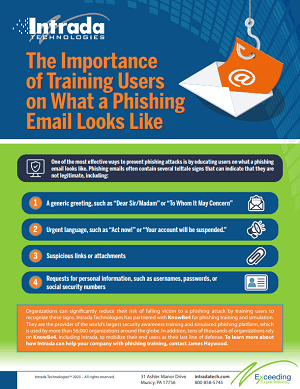At Intrada, web design is more than just a visual presentation. It’s an engaging experience that captivates viewers and drives them to act. Quality web design should be user-friendly, aesthetically pleasing, and above all else, results driven.We believe in the power of quality web design to create m...
The Importance of Training Users on What a Phishing Email Looks Like
Information Technologies | James Haywood | Monday, April 24, 2023
Phishing attacks are one of the most common cyber-attacks organizations face today. In a phishing attack, attackers send fraudulent emails that appear to be from a trusted source, intending to trick users into clicking on a malicious link or downloading a malicious attachment. These attacks can result in significant financial loss, data theft, and reputational damage for organizations. To combat this threat, it is essential that users are trained to recognize phishing emails and that organizations utilize a phishing training and simulation provider to provide effective training.
One of the most effective ways to prevent phishing attacks is by educating users on what a phishing email looks like. Phishing emails often contain several telltale signs that can indicate that they are not legitimate, including:

- A generic greeting, such as "Dear Sir/Madam" or "To Whom It May Concern"
- Urgent language, such as "Act now!" or "Your account will be suspended."
- Suspicious links or attachments
- Requests for personal information, such as usernames, passwords, or social security numbers
Organizations can significantly reduce their risk of falling victim to a phishing attack by training users to recognize these signs. In addition, users should be trained on how to verify the authenticity of an email, such as by checking the sender's email address, looking for spelling and grammar errors, and contacting the supposed sender directly to verify the message's legitimacy.
The Importance of Using a Phishing Training and Simulation Provider
While manual user training is essential, more is needed to prevent phishing attacks. Attackers constantly evolve their tactics, and it can be challenging for organizations to keep up with the latest threats. This is where a phishing training and simulation provider comes in.
A phishing training and simulation provider can provide organizations with a comprehensive training program that includes training videos and documentation and simulated phishing attacks that mimic real-world threats. These simulations can be customized to match the specific threats an organization faces and can be used to identify areas where users need further training.
In addition to improving user awareness, a phishing training and simulation provider can provide valuable data on an organization's susceptibility to phishing attacks. This data can be used to identify areas where additional security measures are needed, such as stronger password policies or more robust email filtering.
How Can Intrada Help?
Phishing attacks are a significant threat to organizations of all sizes, and users must be trained to recognize phishing emails. By utilizing a phishing training and simulation provider, organizations can provide effective training beyond simple awareness and identify vulnerabilities in their security posture. With the proper training and tools, organizations can significantly reduce their risk of falling victim to a phishing attack and protect their assets and reputation.
Intrada Technologies has partnered with KnowBe4 for phishing training and simulation. They are the provider of the world’s largest security awareness training and simulated phishing platform, which is used by more than 56,000 organizations around the globe. In addition, tens of thousands of organizations rely on KnowBe4, including Intrada, to mobilize their end users as their last line of defense. To learn more about how Intrada can help your company with phishing training, contact James Haywood.

Cybersecurity Awareness Poster
An Introduction to GitHub Copilot
GitHub Copilot is an artificial intelligence (AI) based coding assistant developed by GitHub in collaboration with OpenAI. It is designed to provide AI-powered code suggestions and autocomplete for developers in real-time as they write code. Copilot uses natural language processing (NLP) algorithms ...
Contact Us
- 800-858-5745
31 Ashler Manor Drive
Muncy, PA 17756
Office Hours
Monday - Friday
8 AM - 5 PM EST
Intrada Technologies


Copyright © 2025 - Intrada Technologies - Privacy Policy and Disclaimer
Our website uses cookies and analytics to enhance our clients browsing experience. Learn More /

